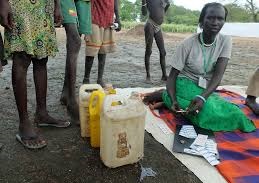Today, the Government of Japan, in partnership with UNICEF, launched a transformative initiative to enhance sanitation and prevent disease outbreaks in the conflict-affected Amhara and Tigray regions of Ethiopia.
The event launched in Tigray and Amhara marks a significant step toward restoring dignity, health, and resilience for vulnerable communities impacted by conflict. Through the generous funding of US$2.32 million from the Government of Japan, the 12-month project will reach over 189,000 people, including women, girls, and persons with disabilities, with access to basic and safely managed household sanitation services through the installation of innovative Sato Pans.
“This initiative exemplifies the profound collaboration between the Government of Japan, the Government of Ethiopia, and UNICEF, through dignity, innovation, and resilience to uplift communities,” said Dr. Aboubacar Kampo, UNICEF Representative in Ethiopia. “This reflects our shared commitment by ensuring that no child is left behind, especially in times of crisis.”
In addition, the project will benefit 250,000 people using RapidPro, a UNICEF digital messaging platform, delivering culturally appropriate hygiene messages directly to households via free SMS provided by Safaricom Ethiopia. The SMS channel has been activated through a partnership between UNICEF and Safaricom, enabling two-way communication for real-time feedback and community engagement. This approach will strengthen accountability, improve service delivery, and support behavior change at scale.
The initiative’s core strength lies in its focus on local empowerment and capacity building. By training youth and masons to install, repair, and maintain sanitation facilities, it ensures technical sustainability and community ownership. Health Extension Workers and Community Health Village Leaders will drive behaviour change through house-to-house demonstrations, tackling misconceptions and promoting sanitation practices, particularly in underserved households. Additionally, U-Reporters will harness digital platforms to amplify youth voices, disseminate hygiene information, gather real-time community feedback, and elevate local solutions.
The project prioritizes women, girls, and persons with disabilities, addressing the risks of gender-based violence, enhancing privacy, and promoting gender-responsive infrastructure. It also reinforces gender equality, local leadership, and equity in access to sanitation services.
Aligned with Sustainable Development Goals (SDGs) — particularly SDG 3 (Health and Well-being) and SDG 6 (Clean Water and Sanitation) — the initiative also supports Japan’s commitment to universal health coverage and human security.
This intervention builds on Japan’s previous investments in WASH and post-conflict infrastructure recovery in Ethiopia. It also contributes to Japan’s broader vision for Africa’s development, in the lead-up to TICAD 9 (Tokyo International Conference on African Development), scheduled for 2025.

